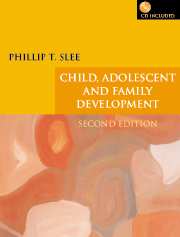Book contents
- Frontmatter
- Contents
- List of Trends and issues
- List of Family life-cycles
- List of Figures and Tables
- Note to the Student
- Note to the Instructor
- How to use the CD-ROM
- Acknowledgements
- Introduction
- Part 1 The Study of Human Development
- Part 2 Conception and Birth
- Part 3 Infancy
- Part 4 Toddlerhood
- Part 5 The Pre-school Years
- Part 6 Middle Childhood
- 15 Physical Development in Middle Childhood
- 16 Cognitive Development in Middle Childhood
- 17 Social and Emotional Development in Middle Childhood
- Part 7 Adolescence
- Part 8 Studying Human Development
- Glossary
- References
- Index
- STUDENT FEEDBACK FORM
16 - Cognitive Development in Middle Childhood
from Part 6 - Middle Childhood
- Frontmatter
- Contents
- List of Trends and issues
- List of Family life-cycles
- List of Figures and Tables
- Note to the Student
- Note to the Instructor
- How to use the CD-ROM
- Acknowledgements
- Introduction
- Part 1 The Study of Human Development
- Part 2 Conception and Birth
- Part 3 Infancy
- Part 4 Toddlerhood
- Part 5 The Pre-school Years
- Part 6 Middle Childhood
- 15 Physical Development in Middle Childhood
- 16 Cognitive Development in Middle Childhood
- 17 Social and Emotional Development in Middle Childhood
- Part 7 Adolescence
- Part 8 Studying Human Development
- Glossary
- References
- Index
- STUDENT FEEDBACK FORM
Summary
‘Grown-ups Love Figures’
Grown-ups love figures. When you tell them that you have made a new friend, they never ask you any questions about essential matters. They never say to you, ‘What does his voice sound like? What games does he love best? Does he collect butterflies?’ Instead they demand: How old is he? How many brothers has he? How much does he weigh? How much money does his father make?' Only from these figures do they think they have learned anything about him.
Antoine de Saint-Exupery, The Little PrinceKEY TERMS AND CONCEPTS
Concrete operations
Conservation
Classification
Seriation
Theory of mind
Pre-riddle
Cognitive congruency principle
Learning style
Auditory learning style
Visual learning style
Kinaesthetic learning style
Moral development
Concrete-experience learning style
Abstract–conceptual learning style
Reflective–observation learning style
Active-experience learning style
Deep learning
Surface learning
Heteronomous morality
Autonomous morality
Immanent justice
Egocentrism
Realism
Justice concept
Autonomous reality
Introduction
In The Little Prince, Antoine de Saint-Exupery reminds us that there are other ways of looking at and understanding the world apart from through adult eyes. During the primary school years, children make significant strides in terms of their cognitive development. This chapter describes the nature of some of the changes that occur in the way children think about and understand their world in middle childhood. The Family Life-cycle: 16 looks at counselling children in families.
Theoretical foundations
Jean Piaget has made a significant contribution to our understanding of children's cognitive development during middle childhood. From Table 16.1 it can be seen that Piaget places the primary school child largely within the concrete operations period. In the sensori-motor period, the child accomplishes a number of significant cognitive skills, including the achievement of object permanence and the imitation of actions.
- Type
- Chapter
- Information
- Child, Adolescent and Family Development , pp. 330 - 357Publisher: Cambridge University PressPrint publication year: 2002

